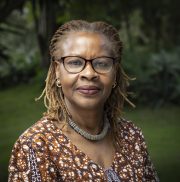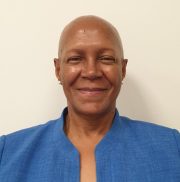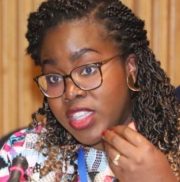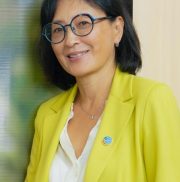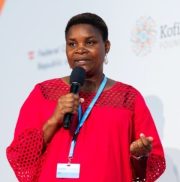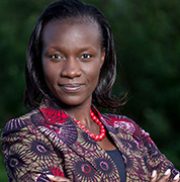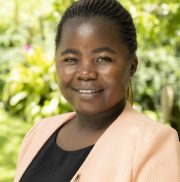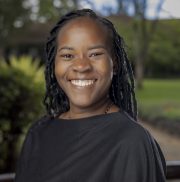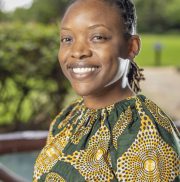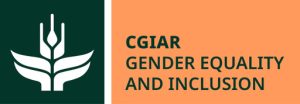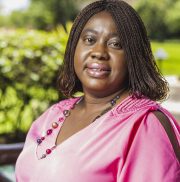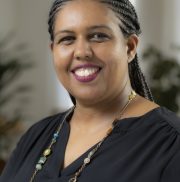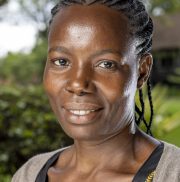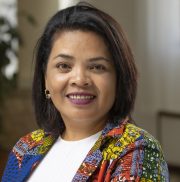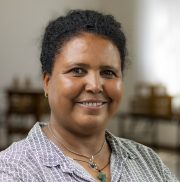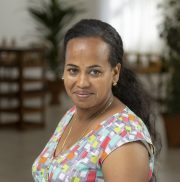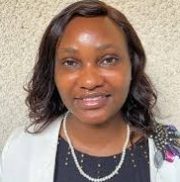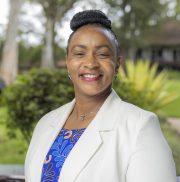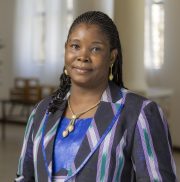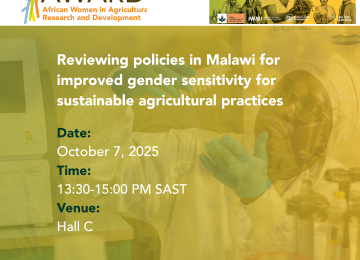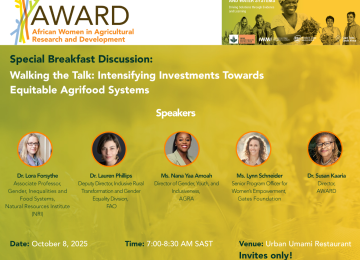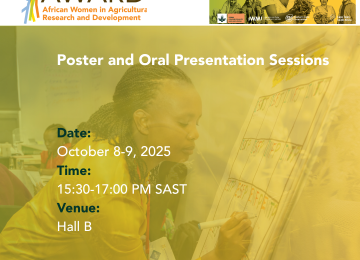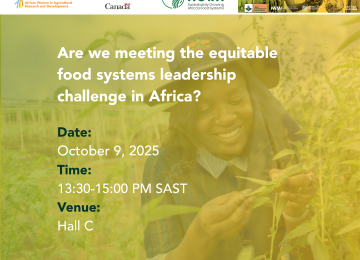AWARD at CGIAR International Gender Conference 2025
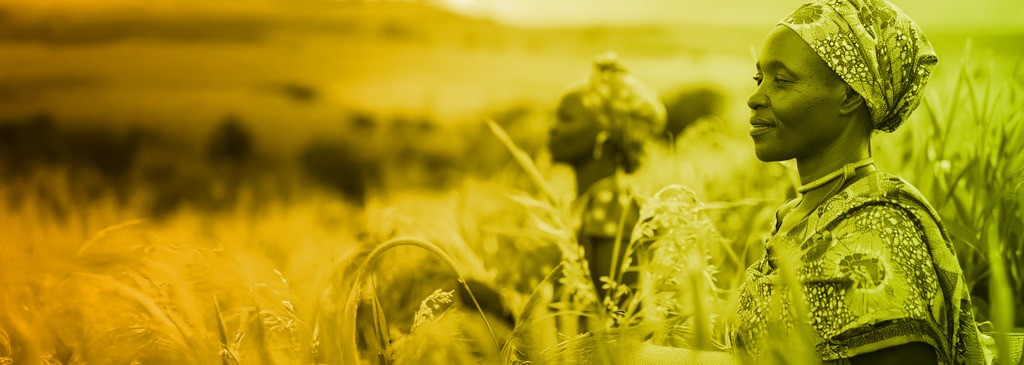
The International Gender Conference themed “Accelerating Equality in Food, Land, and Water Systems: Driving solutions through Evidence and Learning” brings together researchers from various organizations and knowledge users policymakers, practitioners, private sector actors, local and indigenous communities and others who work toward creating innovations and generating evidence to transform food systems. The conference will be held in Cape Town, South Africa and is co-organized by the CGIAR Gender Equality and Inclusion and partners.
Click here to visit the Gender Conference Page
African Women in Agricultural Research and Development (AWARD) will join other partners to showcase our work, lead and contribute to insightful conversations while exploring new partnerships to intensify our work on fostering equitable agrifood systems.
Shaping Inclusive Climate-Smart Agriculture Policies in Malawi
Meet Ms. Grace Chilongo, a 2022 AWARD Policy Fellow, reveals structural inequalities and policy implementation gaps in Malawi’s climate policies. Applying GAPo and WEAGov gender analytical tools, she uncovers entry points such as gender-disaggregated indicators in CSA monitoring frameworks, budget allocations, and amplifying women’s voices to shape inclusive priorities for climate resilience in Malawi
Policies
- National Agriculture Policy(2016)
- National Climate Change Management Policy(2016)
Prioritising women’s needs into Nigeria’s National gender in agriculture and funding policies
Ms. Vera Onyeaka-Onyilo, a 2022 AWARD Policy Fellow, found that despite the Federal Government of Nigeria introducing eight credit schemes, none are gender-sensitive, leaving women with limited access due to socio-cultural barriers in the financial sector. She calls for credit schemes that prioritize women’s needs and for a credit scheme for women farmers only (Women in Agriculture Credit Guarantee Fund-WACF). She also calls for gender to be integrated into fund allocations under the new National Agriculture Development Fund (NADF) to strengthen the economic empowerment of smallholder women farmers.
Policies
- National Gender Policy in Agriculture, National Agricultural Development Fund (NADF)
- National Agricultural Technology and Innovation Policy, National Gender Policy
- National Agricultural Technology and Innovation Policy, National Gender Policy, National Financial Inclusion.
Embedding Gender in Malawi’s Agroecology for Resilient Food Systems
Ms. Tendai Museka, a nutritionist and 2022 AWARD Policy Fellow, reveals that although agroecological feature in Malawi’s agricultural policies, they had partially integrated the 13 agroecology principles and gender, limiting their transformative impact for rural farmers. She recommends a standalone agroecology strategy that embeds gender, defines clear institutional roles, and integrates systematic women’s empowerment assessments to drive equitable, climate-resilient food systems.
Policies
- Malawi 2063, National Agriculture Policy (2024)
- The Agriculture Land Resources Management Policy (2024)
- The National Biodiversity Strategy and Action Plan (2015-2025)
- The National Multi-sector Nutrition Policy (2018-2022)
- Malawi National Resilience Strategy (2018-2030)
Strengthening use of Climate- Smart Technologies in Zambian Agriculture Policies
Dr. Nelia Nkhoma Phiri, a 2022 AWARD Policy Fellow, is advocating for the integration of gender considerations in Zambia’s National Agricultural Policies—such as the Second National Agriculture Policy (2016) currently under review—at the policy design stage. Her work promotes the adoption of sustainable climate-smart seed cultivars that are nutritionally and environmentally smart; while ensuring they are accessible to both women and youth.
Policies
- Second National Agriculture Policy (SNAP) (2016-2020)
- National Seed policy (NSP) (2012)
- National Gender Policy (2023)
Empowering Rural Young Women through Equitable Access to Employment in the Agrifood Sector
Meet Ms. Soyome Alemayehu, a 2024 AWARD Policy Fellow, who is initiating a Policy Innovation Project to promote gender-responsive reforms in Ethiopia’s One-Stop Service Centres (OSSCs) services. focuses on revising OSSC guidelines/directives to address the structural barriers that limit rural young women’s access to employment opportunities in the agrifood sector. Through this initiative, she aims to engage key stakeholders—including policymakers, OSSC practitioners, and rural young women – to co-design inclusive strategies that foster equitable job creation within the agrifood sector in the Oromia and Sidama regions.
Policies
- Micro, Small, and Medium Enterprises (MSME) Development Policy (2024)
- OSSC Implementation Guidelines (2022)
Closing Gender Data Gaps in Uganda Forestry Policies
Ms. Susan Nansereko, a 2022 AWARD Policy Fellow, is tackling gender data gaps in Uganda’s forestry policies. The lack of gender- and sex-disaggregated data weakens national statistics, decision-making, and budgeting, undermining sustainable forest management and women’s empowerment. Her work promotes the integration of reliable gender data to drive equitable poverty reduction and strengthen women’s voices in natural resource management
Policies
- Draft Forestry Policy (2022)
- National Agricultural Policy (2013)
- National Wetlands Policy (1995)
- National Environment Management Policy (1994)
Prioritising women’s needs into Nigeria’s National gender in agriculture and funding policies
Ms. Hanitriniaina Julia RANDRIANARIVELO, a 2023 AWARD Policy Fellow, addresses two critical gaps in Madagascar’s fisheries and Blue Economy policies. First, women, who lead nearly 80% of post-harvest fish processing remain invisible in policies and statistics, limiting their access to training, credit, and decision-making spaces. Second, poor preservation methods cause up to 40% post-harvest losses, undermining food safety and nutrition, while undervaluing dried and smoked fish products. Her PIP seeks to influence the National Blue Economy Strategy (2023–2033) by making women’s contributions visible, developing gender-responsive food safety guidelines, promoting innovative preservation methods, and engaging policymakers to build accountability systems. The ultimate aim: a resilient, inclusive, and gender-responsive Blue Economy for Madagascar
Policies
- National Blue Economy Strategy (2023–2033)
Shaping Inclusive post-harvest Management strategy in Ethiopia
Ms. Tinsaie Birhanu Yitayew, a 2023 AWARD Policy Fellow, underscores that Ethiopia’s National Postharvest Strategy (2023–2030) is gender-neutral, risking deeper inequalities even as postharvest losses threaten food security, nutrition, and economic stability. Her PIP maps gender roles across harvesting, drying, storing, processing, transporting, and marketing to identify women’s unique constraints, such as time poverty, mobility, and limited access to finance and technology. By promoting culturally appropriate, labor-saving innovations—like solar dryers and improved storage bags—and contributing field-based evidence from Amhara and Oromia, she aims to influence policies toward more inclusive and resilient postharvest systems
Policies
- Ethiopian Postharvest management strategy (2023)
- Ethiopian Extension strategy (2017-2030)
- Ethiopian Agricultural policy (2017-2026)
Securing Inclusive Land Rights Policies in Post-War Tigray in Ethiopia
Ms. Rahwa Abrha, a 2022 AWARD Policy Fellow, underscores that while land remains the cornerstone of rural livelihoods in Ethiopia, women in post-war Tigray continue to face inequities in access and control. Despite constitutional guarantees of equal rights, the conflict deepened gender disparities, leaving many women leasing land to men and excluded from decision-making bodies. She recommends reforms to ensure fair land allocation for women and youth, stronger female representation in land governance, and alignment of customary practices with national laws protecting women’s land rights
Policies
- Ethiopia’s Rural Land Administration and Land Use Proclamation (Proc. No. 456/2005)
- Proclamation No. 133/2006 of the Tigray National Regional State
- The Constitution (Article 40)
Empowering Nigeria Women Farmers Through Seed Policy Reform
Ms. Olamide D. Nwanze, an extensionist and 2022 AWARD Policy Fellow, is unearthing deep-rooted gender and social norms in Nigeria’s seed policy and guidelines that limit women’s eligibility, certification, and participation in decentralized community-based seed entrepreneurial opportunities. Her policy research aims to foster more inclusive and equitable seed systems by ensuring access to improved varieties, increased entrepreneurial participation and opportunities for women, youth and migrant farmers.
Policies
- Nigeria’s National Gender Policy in Agriculture (2019)
- National Agricultural Seed Policy for Nigeria (2022)
Advancing gender-responsive plant protection policies in Kenya.
Dr. Beatrice Muriithi, a 2022 AWARD Policy Fellow, is working to remove barriers that limit women’s access to sustainable plant protection innovations such as Integrated Pest Management (IPM). Her Policy Innovation Project promotes inclusive adoption of climate-smart agricultural technologies by addressing gender-differentiated needs and structural inequalities, while reviewing Kenya’s key plant protection policies—Agricultural Sector Transformation and Growth Strategy (ASTGS, 2019–2029), Migratory and Invasive Pests and Weeds Management Strategy (2022–2027). Vision 2030, and the National Agricultural Policy (2012)
Policies
- Kenya’s plant protection policies – ASTGS (2019–2029)
- The Migratory and Invasive Pests and Weeds Management Strategy
- Vision 2030
- The National Agricultural Policy (2012)
Building the Resilience of Food Systems Through Inclusive Climate Action Policies in Malawi
Carolyn Munthali, 2022 AWARD Policy Fellow, is championing inclusive climate action in Malawi’s fisheries sector. She advocates for the use of sex-disaggregated data and dedicated gender budgets in national climate policies strengthening resilience, equity and sustainability in fisheries and agrifood systems. She also advocates for more climate change interventions in the fisheries sector to improve the resilience of the fishing communities.
Policies
- Malawi National Climate Change Policy
- Malawi’s Strategy on Climate Change Learning
- Malawi’s National Adaptation Plan Framework
- Malawi Implementation Plan
Advocating for Gender-Smart Climate Policies in Burkina Faso’s Livestock Sector
Dr. Salimata Sonde Pousga, a 2023 AWARD Policy Fellow, highlights that while Burkina Faso’s livestock subsector contributes 14% of agricultural GDP and 13% of AFOLU-related GHG emissions, national policies fail to integrate gender in climate adaptation and emission-reduction strategies. Her PIP seeks to generate gender-sensitive evidence using GAPo and WeGov tools, co-create climate-smart scenarios, and develop advocacy tool including awareness posters, a gender-integration manual, and an advocacy strategy to influence future climate and livestock extension policies. The goal: gender-responsive climate solutions that strengthen resilience and reduce emissions in the livestock sector.
Policies
- Nationally Determined Contribution (NDC) 2024
